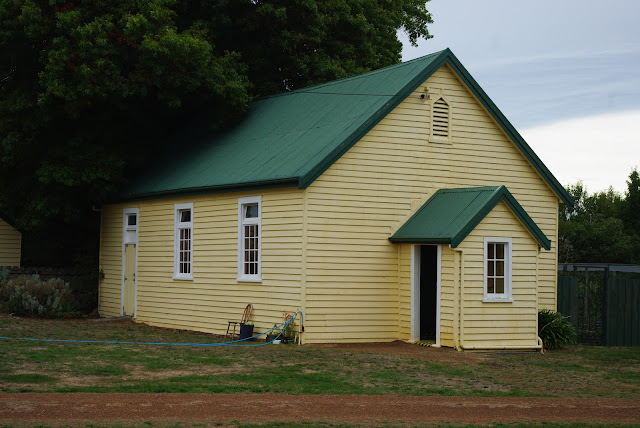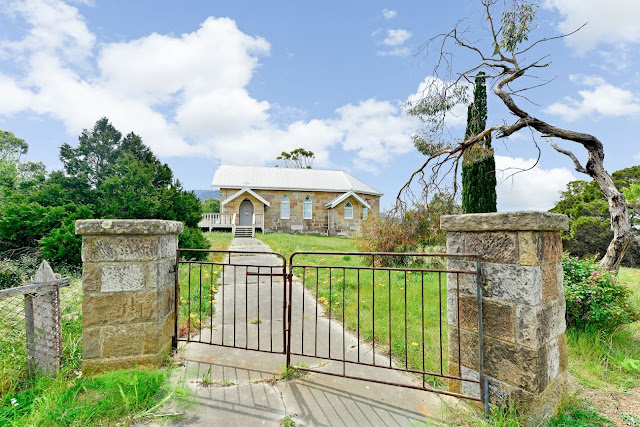No. 1263 - Evandale - St Andrew's Presbyterian Sunday School (1889)
This article is one of a series about buildings associated with Tasmania’s historical churches and religious orders.These buildings include Sunday schools, parish halls, convents, schools and residences of the clergy. Ancillary buildings are often overlooked and rarely feature in published histories. My aim is to create a basic record of these buildings, including buildings which no longer exist.
Evandale is an historic town approximately 20 kilometres from Launceston. Originally established as a military post in 1811, the general area was variously known as Collins Hill, Patersons Plains and Morven. The settlement’s name was changed to Evandale in 1836 in honour of Tasmania's first Surveyor-General, G.W. Evans.
The foundation stone of St Andrew’s Presbyterian church was laid by the Governor, Sir John Franklin in 1838 and the building completed and dedicated in September 1840.
A Sunday school hall was built in St Andrew’s church grounds in 1889 with the building officially opened on Thursday 7 November of the same year. The construction of the Sunday school was made possible by funds provided by Donald Mackinnon in memory of his wife 'Bessie'.
Evandale is an historic town approximately 20 kilometres from Launceston. Originally established as a military post in 1811, the general area was variously known as Collins Hill, Patersons Plains and Morven. The settlement’s name was changed to Evandale in 1836 in honour of Tasmania's first Surveyor-General, G.W. Evans.
The foundation stone of St Andrew’s Presbyterian church was laid by the Governor, Sir John Franklin in 1838 and the building completed and dedicated in September 1840.
A Sunday school hall was built in St Andrew’s church grounds in 1889 with the building officially opened on Thursday 7 November of the same year. The construction of the Sunday school was made possible by funds provided by Donald Mackinnon in memory of his wife 'Bessie'.
The Launceston Examiner reported the opening of the hall as follows:
“Our Evandale correspondent reports that on Thursday evening the new Presbyterian Sunday-school was opened. It is a weatherboard building on stone foundation, with iron roof. Its dimensions are: 40ft long, 22ft wide, 14ft 6in from floor to ceiling, and it will prove a great convenience to the body to which it belongs. The Rev. J. Russell, who presided, said this building had been a dream of his for many years, and about four years ago he commenced collecting the nucleus of a building fund. He referred to one sorrowful incident, the death of Mrs. D. Mackinnon, who took such an interest in the contemplated building, and her husband had donated £100 as a tribute to her memory. The building, at it stood, including porch and platform, cost £177 16s, and reflected credit on the contractor, but though there were a few pounds in hand, it was not sufficient to meet the expense of seating and lighting, and a cabinet organ would be required to properly furnish the building”.
A note on the Mackinnons:
Donald Mackinnon (b.1841) of Dalness, Evandale, Tasmania, was a Justice of the Peace and warden of the municipality of Evandale. On 11th July, 1883, he married Sarah Elizabeth (Bessie), daughter of William Stone, of Kent, England. Sarah Mackinnon died unexpectedly on 7th May, 1889 at the age of 29.
Report on 'Bessie' Mackinnon's funeral - Daily Telegraph - Saturday 11 May 1889:
“To-day the funeral of the late Mrs D. Mackinnon took place at 3.30 p.m., and was the largest ever seen at Evandale. There were in the cortege over 20 vehicles containing friends from the districts of Perth, Longford, Lymington, Deddington, White Hills. and Launceston. The members of the St. Andrew's Society preceded the hearse, whilst a large number followed on foot with over 300 people following. All the shops was closed, and the blinds of private houses drawn in respect of the deceased, who was liked by all, rich and poor, and many shed tears at the grave when the coffin, which was loaded with wreaths was lowered….”.
Sources:
“Our Evandale correspondent reports that on Thursday evening the new Presbyterian Sunday-school was opened. It is a weatherboard building on stone foundation, with iron roof. Its dimensions are: 40ft long, 22ft wide, 14ft 6in from floor to ceiling, and it will prove a great convenience to the body to which it belongs. The Rev. J. Russell, who presided, said this building had been a dream of his for many years, and about four years ago he commenced collecting the nucleus of a building fund. He referred to one sorrowful incident, the death of Mrs. D. Mackinnon, who took such an interest in the contemplated building, and her husband had donated £100 as a tribute to her memory. The building, at it stood, including porch and platform, cost £177 16s, and reflected credit on the contractor, but though there were a few pounds in hand, it was not sufficient to meet the expense of seating and lighting, and a cabinet organ would be required to properly furnish the building”.
A note on the Mackinnons:
Donald Mackinnon (b.1841) of Dalness, Evandale, Tasmania, was a Justice of the Peace and warden of the municipality of Evandale. On 11th July, 1883, he married Sarah Elizabeth (Bessie), daughter of William Stone, of Kent, England. Sarah Mackinnon died unexpectedly on 7th May, 1889 at the age of 29.
Report on 'Bessie' Mackinnon's funeral - Daily Telegraph - Saturday 11 May 1889:
“To-day the funeral of the late Mrs D. Mackinnon took place at 3.30 p.m., and was the largest ever seen at Evandale. There were in the cortege over 20 vehicles containing friends from the districts of Perth, Longford, Lymington, Deddington, White Hills. and Launceston. The members of the St. Andrew's Society preceded the hearse, whilst a large number followed on foot with over 300 people following. All the shops was closed, and the blinds of private houses drawn in respect of the deceased, who was liked by all, rich and poor, and many shed tears at the grave when the coffin, which was loaded with wreaths was lowered….”.
 |
| St Andrew's Presbyterian Sunday School |
 |
| Sarah Elizabeth (Bessie) Mackinnon's headstone in St Andrew's cemetery |
 |
| Dalness at Evandale, built by Donald Mackinnon. Source: Tasmanian Archives and Heritage Office, Whishaw Collection, NS165/1/127. |
Daily Telegraph, Saturday 11 May 1889, page 3
Launceston Examiner, Saturday 2 November 1889, page 2
Launceston Examiner, Tuesday 12 November 1889, page 2
Mercury, Wednesday 20 November 1889, page 2
Von Stieglitz, K. R. and Evandale History Society (Tas.). A history of Evandale / by K.R. Von Stieglitz Evandale History Society Evandale, Tas 1992



Comments
Post a Comment